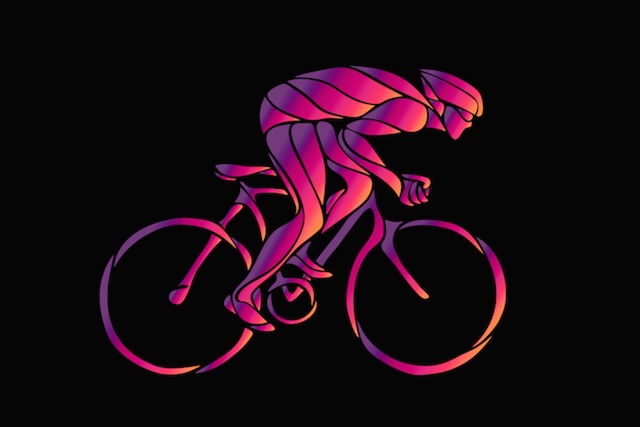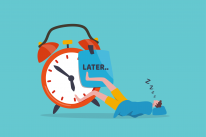
“Motivation is what gets you started. Habit is what keeps you going.” ~Jin Ryun
Can I be brutally honest with you for a moment?
I was the “fat kid” growing up, and I’ve struggled to find the motivation to lose weight and lead a healthy lifestyle my whole life.
I first realized I was fat when the teacher asked for a volunteer to play Santa in the third grade Christmas play, and Aaron Valadez loudly blurted out, “Tim would be perfect for the role since he’s already got the belly!”
I literally died right there. Mortified.
This was the first time in memory when I turned to food to numb my pain and embarrassment. Congratulations to me, I had discovered the emotional rollercoaster known as binging! A rollercoaster which I would struggle to get off of for my entire life…
I can pinpoint the exact moment when I told myself enough is enough.
I was devastated after a recent breakup and was feeling lonely, lost, and depressed.
These were very uncomfortable emotions. And what do I we when I feel uncomfortable emotions? I eat them, of course!
Luckily I had a box of cinnamon buns ready for the occasion. I became powerless to stop myself, as the rush of the binge and my inner saboteur had taken hold. In a moment of sheer ecstasy and gluttonous pleasure I ate eight cinnamon buns in one sitting.
And then….
The rush was over. The sweet taste provided a fleeting moment of relief.
Now all that remained was an empty box, an empty apartment, and an empty heart.
Oh god, what had I done??!!
I shouldn’t be surprised, I had spent the last three weeks repeating this cycle every night before bed.
But today as I was cleaning up the crumbs, I decided I’d clean up my act too!
Tomorrow will be different! I finally had found the motivation to stop the binging, stop the bad habits, and stop treating myself like I was worthless.
Tomorrow, I thought, will be the day I start a healthy diet, start a daily exercise routine, and start treating myself right!
But tomorrow never came.
The next day I was back at it again with the sweets. A moment of relief from the pain of loneliness was far sweeter than anything the gym or a healthy lifestyle had to offer.
Like a moth to a flame I was powerless to resist the sweet temptation, and I didn’t give a damn about my reputation!
Only after the damage was done and the sweets gone did I feel motivated to clean up my act. Motivation was never there in the moments I needed it most. Where had my motivation gone and how could I get it back!?
I’ve discovered that motivation was the last thing I needed. I never found the motivation to stop, and it’s the best thing that’s ever happened to me. Motivation is trash.
Why is Motivation Trash?
I know we all think motivation is what drives action, but in many cases it’s the other way around—actions create motivation.
Have you ever felt like you didn’t want to go to the gym, but then once you put on your gym shoes and walked out the door you felt super motivated and ready to go? That’s an example of motivation coming after the action.
Motivation should never be the sole force driving your actions because it is a temporary emotion. Just like you can’t feel sad or angry all the time, you can’t feel motivated all the time.
Motivation was not going to save me from my cycle of binging and self-sabotage. My problem was I knew exactly what I needed to do (lose weight), but I didn’t know how or why I wanted to do it.
I needed to connect to the intention, or the why, behind my goals before I could determine how to follow through on them. It’s not what you do; it’s why you do it that will ultimately drive you to succeed.
I also needed something that required very little willpower or motivation; what I needed was a habit.
The Power of Habit and Intention
Habits are at the center of everything we do; most waking hours are spent executing one habit after another without even thinking about it.
What do you do when you wake up? Get out of bed, make the bed, make coffee, drive to work?
These are all examples of habits that are essential for our daily lives to run smoothly. Because they are so engrained in our brain there is very little thought or resistance that occurs when executing our daily routine.
In my case, I knew I needed to create a habit to replace my binging and to get off the couch. I wanted to create a habit of a daily fitness routine and get back to the gym.
Before I could create a habit that would stick, I first had to connect with the intention behind it. A powerful intention is something bigger than just yourself, and is connected to a higher purpose that will have a positive impact on the world.
A habit infused with a powerful intention is what carries me through to get those workouts in even when I’m not feeling motivated to go.
How Intentions Can Give or Take Away Your Power
Intentions are so important because a poorly developed intention can actually drain your energy.
For instance, when I was stuck in the binge cycle my intention was: I want to lose weight because I don’t want to be a disgusting loser fat slob.
Surprise, surprise, this intention sucks! The issue is two fold:
The first problem is that it is not connected to a higher purpose. It’s all about ME ME ME!
Second, it’s framed in a negative way that reinforces the belief that I am a disgusting fat slob.
A negative intention like this destroys my self-confidence and willpower and actually makes me more likely to binge again.
How to Set a Powerful Intention
I knew I needed a more powerful intention to carry me through when temptation rears its ugly head!
My new intention is simple—I want to get in shape to have a healthy life and age gracefully, and I want to inspire others to do the same.
Notice how this intention is connected to a higher purpose, something greater than just myself—inspiring others.
With this new intention, it became clear how laying on the couch eating cinnamon buns hurts not just me but those around me as well. This new intention gave me the energy I needed to follow through on my goals and build the right habits into my daily life when motivation was nowhere to be found.
If you want to create a powerful intention, think about how to connect your goals to something bigger than yourself; this could be having the energy to take care of your family, to help your local community, to save the planet, or anything you want it to be.
There can be multiple intentions behind a habit; try to find the intention you connect with most and focus on that.
How Do You Stick to a Habit?
I found the best way to stick to a habit is first to understand what a habit really is.
Every habit consists of three parts: cue, routine, and reward.
Cues are triggers for habits to begin. For instance, my alarm in the morning is the cue that triggers my morning habit, and the routine kicks in. Having a routine is the best because it takes the motivation and decision making out of the process. No longer is energy wasted on the internal debate thinking about if or when I’m going to the gym. There’s no need to make a decision; I just follow the process.
After the alarm cue I get out of bed, put on my gym clothes, drink a huge glass of water, and then start walking to the gym. When I arrive at the gym I (usually) feel energized and ready to face the workout ahead.
The most resistance I find to starting a new habit is in this first stage. Remember Newton’s first law of motion? Things in motion tend to stay in motion? Well this law also applies to habits!
Once you get started, you build momentum and it becomes easier to follow through.
The Three-Minute Rule
To encounter the least mental resistance to starting a new habit, the goal is to have the shortest cue time possible. A cue time of three minutes or less is my golden rule. This leaves very little time for willpower to falter.
Don’t want to exercise? Make putting on your workout clothes the cue that starts your routine. Once your clothes are on and you are in motion you’ll be well on your way to getting that workout in!
Start Small
The real secret to creating a new habit is to start out small in the beginning.
When I wanted to start working out, I told myself I would go to the gym and only exercise for five minutes. After that I would leave. I didn’t plan to exercise; I only planned to show up. I wasn’t worried about the benefits of exercise; I was focused on building the habit.
I recognized if I didn’t have the habit in place there was no point trying to stick to a routine. Build the habit first and let the rest come naturally.
The truth is, even today when I don’t want to work out, at the very least I’ll go to the gym for five minutes. Even if all I can manage to do is breathe, that’s okay because I’m keeping my momentum going and my habit intact.
Of course I almost always stay for more than five minutes; this is a psychological trick I use to get my ass to the gym even when I’m not motivated.
Importance of Routine
The second stage of a habit is the routine. This is the actual going to the gym and working out part. Once the cue is complete and the habit solidified in your daily life you can pretty much run on autopilot here.
Just think of all the times you’ve been driving home from work and arrived in your driveway only to realize you didn’t remember driving home at all. That is an example of a routine that runs on autopilot. Similarly this idea of autopilot can also apply to your workouts once it becomes a habit.
Reward Reinforces the Habit
The last stage of any habit is the reward stage. In the case of exercise, the reward for me is feeling energized and focused, and getting the rush of feel good endorphins that follow a good workout.
Brain activity spikes in the reward stage, and the link between cue and reward is reinforced. This is what makes habits so hard to break. Every time we complete a habit, it gets reinforced in the brain by the reward.
This means every time I go to the gym it becomes easier to come back because I reinforce the link between the cue and the reward in my brain. Resistance to the workout decreases, and executing my habit of daily exercise becomes easier and easier.
Pro Tip: Writing out a habit with pen and paper has been shown to dramatically increase follow through.
Try writing out this sentence (with pen and paper):
“I’m going to go to exercise on [DAY] at [Time of Day] at [Location]”
By doing this, not only do you increase your chances of exercising, you also turn your time and space into a cue to commence your new habit. Getting started is the hardest part, so the more cues you have, the greater your chances for success.
How Working Out Changed My Life
After I replaced my unhealthy habit of binging with the healthy habit of working out, some rather unexpected benefits occurred in my life. I quit smoking, lost weight, and started making healthy diet choices.
A healthy diet increased my mental energy and willpower, making it much easier to handle the stress of life. Now, instead of opening a box of cinnamon buns when I’m stressed, I’ll open up my gym bag and head out the door. I now treat myself with the respect I deserve. And it all started by stepping foot in the gym for five minutes a day.
If you want to make fitness part of your daily life, stop relying on motivation this instant!
Get connected to the intention behind your goals and make it about something bigger than just yourself.
Once you have your intention, write down with pen and paper the time and place of your workout to increase your chances for success.
Create a habit of going to the gym or hiking or practicing yoga or doing whatever exercise you enjoy—the shorter the cue time to begin your fitness routine the more likely you are to follow through.
Start small and commit to exercising at least five minutes a day. Build the habit before worrying about the actual workouts.
After you have a habit of exercising, experiment to find a workout plan you find fun and can follow consistently.
And remember, things in motion stay in motion! Meaning even if you feel like being lazy and sitting on the couch, it’s very likely once you actually get started you will find the motivation for an amazing workout. Remember motivation often comes after the action and not before. Just get started already!!!
I’m not special. I struggle with my weight and self-image every single day. I have to constantly battle debilitating neurotic thoughts telling me I’m not good and I should just give up. These are some of the tips I used to pick myself up out of a depression and get in shape when I wasn’t feeling motivated. With these tips I know you can do the same!
About Timothy James
Timothy is a health coach focused on using simple mindfulness strategies to build habits and achieve weight loss goals.













 Though I run this site, it is not mine. It's ours. It's not about me. It's about us. Your stories and your wisdom are just as meaningful as mine.
Though I run this site, it is not mine. It's ours. It's not about me. It's about us. Your stories and your wisdom are just as meaningful as mine. 